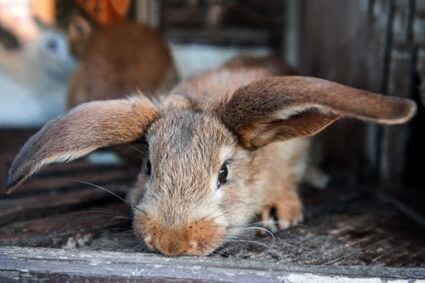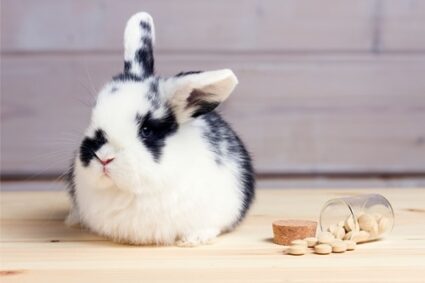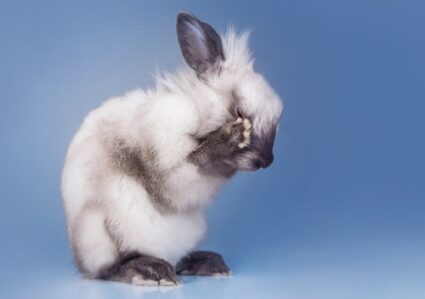If you’ve heard a rabbit cry, you’ll know how distressing it sounds. It’s the kind of noise that stays with you but which you struggle to put into words. The sound of a rabbit crying is sometimes compared to a whimper, a grunt, or even a scream.
Rabbits cry when they are in pain, scared, or about to die. Also, baby rabbits (kits) cry when they are starving. Even though rabbits make crying noises, they don’t produce any tears. If your rabbit’s eyes are wet or weeping, she may have a dental disease, allergies, or an infection.
Rabbits don’t usually make crying noises when they are sad or lonely. They are more likely to withdraw and stop grooming themselves. So, when caring for your rabbit, pay close attention to her behavior, not just the sounds she makes.
Why Do Rabbits Cry?
Rabbits cry for four different reasons. These include:
- Extreme Hunger – This only really applies to baby rabbits.
- Fear – Rabbits may cry out in terror if they see a predator, or they are taken by surprise. Extreme fear causes rabbits to cry because they think they are going to die.
- Pain – Rabbits sometimes whimper and cry when in pain. For example, Urinary Tract Diseases might cause rabbits to cry when passing urine.
- Death is Approaching – It’s more common for rabbits to ‘scream’ when approaching death. But some owners say they heard a soft, whimpering sound before their rabbit died.
So, rabbits tend to cry when there is a physiological emergency of some sort.
Do Rabbits Cry Tears?
Rabbits do not produce tears when they cry. It’s true that rabbits do have tear ducts in their bottom eyelids, and the tear ducts help to drain excess moisture from the eyes.
However, there is no evidence to suggest that rabbits cry tears when they are hungry, scared, or in pain. Neither do they cry when experiencing other emotions, like loneliness.
A rabbit’s eyes should be clean and glassy. If your rabbit’s eyes are wet and gunky or the fur beneath the eyes is damp, this is a medical problem rather than an emotional one. Your rabbit probably has a condition called ‘Weepy Eye.’
Is Rabbit Crying the Same as Human Crying?
Rabbit crying is not exactly the same as human crying. As mentioned, rabbits don’t produce tears when they cry, whereas humans usually do.
Also, rabbits cry in response to physiological emergencies (hunger, pain, fear, death). Humans do this too, but human crying is quite often caused by emotions (joy, sadness, loneliness, etc.)
That’s not to say that rabbits aren’t emotional. It’s just to say that rabbit crying is not necessarily an indicator of whether a rabbit is feeling sad, lonely, depressed, etc. Instead, rabbit crying is a sign that your rabbit needs urgent support.
What Do Rabbit Crying Noises Sound Like?
Rabbits are vocal animals, so it can be hard to differentiate between different noises. In truth, rabbit noises can get ‘lost in translation’ because different owners describe them in different ways.
Rabbit ‘crying’ could also be described as ‘whimpering’ or ‘grunting,’ and, in severe cases, a cry may sound more like a ‘scream.’
Also, when a baby rabbit cries, it often sounds like a sheep bleating. Crying is more common in baby rabbits than adult rabbits, so let’s explore exactly why baby rabbits cry.
Why Do Baby Rabbits Cry Out?
Baby rabbits (wild and domestic) will sometimes cry out. The most common reasons for this are hunger and extreme fear. Crying is normal to a certain extent, but if it continues for long periods of time, this would be concerning.
However, you should be very careful when investigating a situation like this. Interfering can sometimes do more harm than good.

Baby Rabbits Crying when Hungry
Baby rabbits are fed by their mothers once a day. In the wild, the mother returns around dusk to feed her babies. Similarly, a pet doe will only feed her babies once a day.
It is normal for baby rabbits to cry out near feeding time, especially if the mother is late feeding them. But if a baby rabbit is crying continuously throughout the day, this suggests it is very hungry.
In the wild, mother rabbits sometimes get killed so the babies become orphaned. In this case, the babies may cry and scream with hunger throughout the day.
Don’t immediately assume that a crying baby rabbit is hungry. Baby rabbits can die from being overfed, so feeding a wild baby rabbit is a no-no.
How to Know if a Baby Rabbit is Hungry
If a baby rabbit is dangerously hungry, his/her tummy will be slightly caved in. If a rabbit has been crying for long periods of time and its tummy is caved in, this suggests it may be orphaned.
You can also check if a rabbit is dehydrated by gently pinching the fur at the back of the neck. If it takes several seconds for the skin to ping back into place, this suggests it is dangerously dehydrated.
If you find a wild baby rabbit that is hungry or dehydrated, you should call a wildlife rehabilitation service for assistance. Caring for kits is notoriously difficult and not something that you should try to do yourself.
Occasionally, a doe may reject her babies which will lead to malnourishment. That’s why it is important to check that the mother rabbit is feeding her babies daily (but don’t force her to spend all day sitting close to her kits).
Baby Rabbits Crying when Scared
Baby rabbits may also ‘bleat’ when scared. Although this noise may sound cute, it is a sign that the rabbit is extremely stressed.
Baby rabbits will often bleat or cry when picked up. That’s why you should never handle a wild baby rabbit unless you have to.
Try not to handle pet baby rabbits for the first 8 weeks of their life. After this time, you can begin handling them but be very gentle. If you take them by surprise, they may start to whimper and cry.
It’s best to sit next to the rabbit for several minutes before attempting to handle them and keep noise to a minimum.
Stressful Things That Can Cause Rabbit Crying
It’s not just kits that cry in fear, it’s adult rabbits, too. When rabbits cry out of fear, the noise often sounds like a ‘scream.’ Here are some of the significant causes of stress in pet rabbits:
- Handling too regularly – This can sometimes happen in large families, as it can be hard to keep track of who has handled the rabbit and for how long.
- Inappropriate handling – Such as not supporting your rabbit’s spine during the lifting process.
- Feeling at Risk During Pregnancy – If a pregnant doe is placed in a threatening situation, she will usually begin to cry or whimper. For example, if she is placed in a cage with a buck.
- Seeing a Predator – This one is pretty obvious, but we sometimes forget how sensitive rabbits are to other animals and humans.
- Fireworks, Loud Music, or Other Loud Noises – These can send rabbits into a state of shock.
- Temperature Changes – Rabbits often make light ‘grunting’ sounds when overheated.
Do Rabbits Cry When in Pain?
Often, the crying noises will sound like whimpers or grunts. Urinary Tract Disorders often cause rabbits to cry when passing urine. However, other conditions such as arthritis, GI stasis, and infections can also cause whimpering and crying.
How to Know If Your Rabbit Is in Pain
If your rabbit is in pain from an ongoing illness, you’d also see some of the following symptoms:
- A huddled-over or hunched appearance
- Taking longer to eat
- A disheveled appearance
- Teeth chattering/grinding, which suggests severe pain
If your rabbit has started crying out of the blue, this may well suggest she is in pain.
Do Rabbits Cry When They Die?
It is quite common for rabbits to make noise when death is approaching. Sometimes, rabbits ‘scream’ just before death and this noise can be very upsetting.
Although less common, some owners also report hearing whimpering or soft grunting just before a rabbit death. For example, there have been quite a few reports of rabbits crying for several seconds and then convulsing. In these cases, heart attack or E. Cuniculi infection may be the cause of death.
Do Rabbits Cry When Sad or Lonely?
In rabbits, crying is usually an expression of fear, pain, hunger, or death. Crying is not usually caused by emotions such as sadness, loneliness, or joy.
That’s not to say that rabbits don’t get lonely. Rabbits living alone will almost certainly become lonely and depressed. As such, loneliness is something to be wary of when keeping rabbits. When rabbits become sad and lonely, they may exhibit the following symptoms:
- Lethargy
- Sleeping more than usual
- Avoiding being picked up
- Change in appetite (usually a loss of appetite)
- Fur pulling

Why Is Loneliness So Dangerous in Rabbits?
In the wild, rabbits live in groups, so they are very sociable animals. That’s the reason why most animal welfare agencies strongly recommend keeping bonded pairs (or groups) of rabbits.
Just like humans, rabbits need social contact to thrive and feel happy. Research tells us that, in humans, loneliness is a major risk factor for death. This is likely to be the same in rabbits, so it’s vital to check that your pet bunny isn’t feeling lonely.
If a rabbit does become lonely, this can cause prolonged stress and weaken the immune system. In turn, this will leave them exposed to bacterial and viral infections.
So, even if your rabbit isn’t crying, don’t assume that she’s OK. Check on her regularly to make sure.
My Rabbit Looks Like She’s Being Crying
Rabbits do not produce tears when they cry out. So, if your rabbit’s eyes are wet or gunky, this suggests she is unwell.
Tear-stained fur is also a cause for concern because this suggests the tear duct may have become blocked.
It’s important to see a vet when this happens because there are many causes of weepy eyes – some of which are very serious.
What Causes Weepy Eye in Rabbits?
Epiphora (watery eyes) is quite common in rabbits. Excessive tears are not only bothersome but can lead to more serious problems. But what causes watery eyes in rabbits? Well, according to PDSA, there can be various causes:
- Dental disease – This is probably the most common cause of epiphora in rabbits.
- Infections – This may cause the discharge under the eyes to be yellow or gunky.
- Blocked Tear Ducts – Tear ducts can become blocked by small pieces of debris. This is much more common in flatter-faced breeds (I.e. Lop, dwarf, etc.)
- Allergies
- Extra Eyelashes – These can rub against the inner eyelid and cause extreme aggravation.
If ‘weepy eye’ is not treated, it could lead to an eye ulcer which is extremely serious and often life-threatening.
What to Do If a Rabbit is Crying
Do not ignore a rabbit’s cries. As mentioned, crying is usually caused by a physiological emergency, so your assistance may be required.
However, if you are attending to a wild baby rabbit, bear in mind that some crying is normal, especially at dusk. If the crying continues for most of the day, or you know the babies’ mother has been killed, then contact a wildlife rehab center for assistance.
If your pet rabbit is crying out, then she may be in pain, fear, or approaching death. Consider any additional symptoms and use your judgment to decide which is more likely to be the case.

